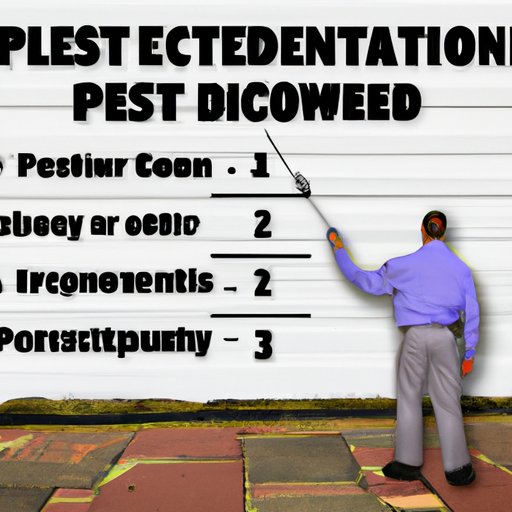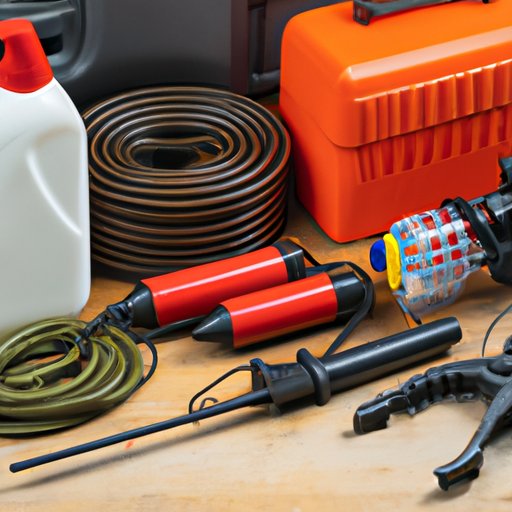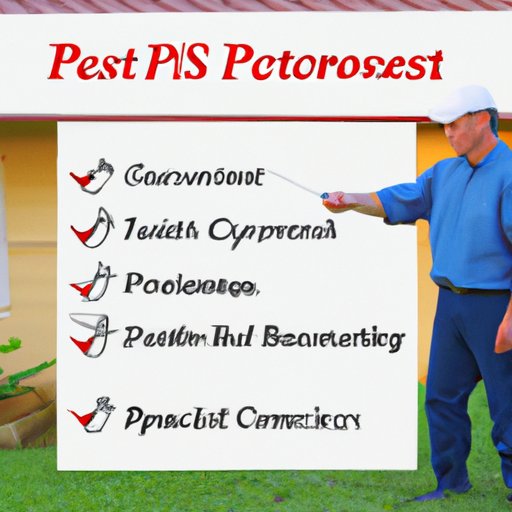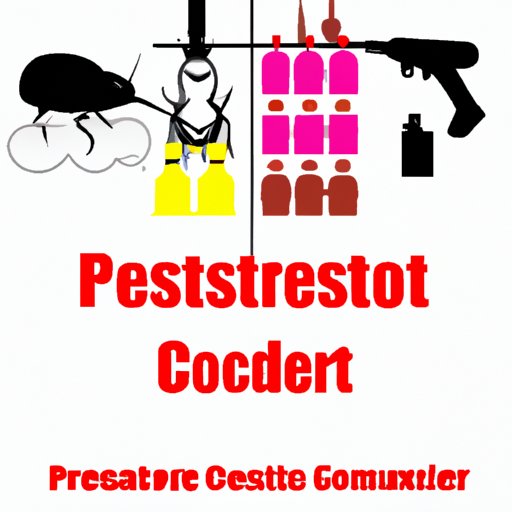Introduction
A pest control business is a service that eliminates or manages pests such as rodents, insects, and other animals. It is an essential service for homeowners and businesses alike, as pests can cause health concerns and damage property. Starting a pest control business offers entrepreneurs the chance to create a successful and profitable enterprise.
In this guide, we’ll provide an overview of the steps necessary to start a pest control business. We’ll discuss the licensing and regulatory requirements, the equipment and supplies needed, and the benefits associated with this type of business.

Steps Needed to Start a Pest Control Business
Starting a pest control business requires careful planning and research. There are several steps you’ll need to take in order to ensure success. These include:
Research the Market and Competition
The first step in starting a pest control business is to research the local market and competition. This will help you understand the size and scope of the industry, as well as what services competitors offer. You should also analyze the demographics of your target market, review competitors’ prices and services, and assess current market trends.
Obtain Necessary Licensing and Regulatory Requirements
Before starting a pest control business, you’ll need to obtain all necessary licenses and permits. This includes learning about local, state, and federal regulations, as well as understanding the necessary insurance requirements. You may also need to become certified as a pest control technician.
Acquire Necessary Equipment and Supplies
Once you have the proper licenses and permits in place, you’ll need to acquire the necessary equipment and supplies for your business. This includes identifying the tools and chemicals required for different types of pest control services.
Develop an Effective Business Plan
Developing an effective business plan is essential for any successful business. Your business plan should include your mission statement, budget, marketing plan, and strategy for growth. It should also outline your operational procedures, customer service policies, and financial goals.
Licensing and Regulatory Requirements for Starting a Pest Control Business
Before starting a pest control business, you’ll need to make sure you comply with all local, state, and federal regulations. This includes obtaining any necessary licenses and permits, as well as understanding the insurance requirements. Depending on where you live, you may also need to become certified as a pest control technician.
Learn About Local, State and Federal Regulations
You’ll need to research the specific laws and regulations related to pest control in your area. This includes any applicable licensing and permit requirements, as well as any additional safety measures you must take. You’ll also need to familiarize yourself with the proper disposal methods for hazardous materials.
Understand the Necessary Insurance Requirements
In addition to the necessary licensing and permits, you’ll need to obtain the appropriate insurance for your business. This includes general liability insurance, workers’ compensation insurance, and professional liability insurance. Make sure you understand the coverage provided by each policy, as well as the cost of the premiums.
Get Certified as a Pest Control Technician
Depending on where you live, you may need to become certified as a pest control technician. This certification is typically offered through trade schools or community colleges. It involves taking classes and passing exams to prove your knowledge of pest control techniques.

Equipment and Supplies Necessary to Operate a Pest Control Business
Once you have the necessary licensing and permits in place, you’ll need to acquire the necessary equipment and supplies to operate your business. This includes identifying the tools and chemicals required for different types of pest control services.
Identify Necessary Tools and Chemicals
You’ll need to identify the tools and chemicals necessary for different types of pest control services. This includes traps, baits, sprays, dusts, and other products. You should also consider investing in protective gear such as gloves, respirators, and eye protection.
Investigate Different Types of Pest Control Services
It’s important to investigate the different types of pest control services you’ll offer. This includes residential services, commercial services, industrial services, and agricultural services. Each of these types of services requires different tools and techniques, so make sure you understand the differences before investing in any equipment.
Analyze the Market and Competition for Pest Control Services
Before starting a pest control business, you’ll need to research the market and competition. This includes analyzing the demographics of your target market, assessing current market trends, and reviewing competitors’ prices and services. This will help you determine the best way to position your business in the marketplace.
Research the Demographics of Your Target Market
It’s important to research the demographics of your target market. This includes understanding their age, income level, geographical location, and interests. This information will help you determine the best marketing strategies to reach them.
Assess the Current Market Trends
It’s also important to assess the current market trends. This includes understanding the demand for pest control services, as well as any changes in technology or regulations that could affect your business. Knowing this information will help you stay ahead of the competition.
Review Competitors’ Prices and Services
Finally, it’s important to review your competitors’ prices and services. This will help you determine the best pricing structure for your business. You should also review their customer service policies, as this will help you develop your own policies to ensure customer satisfaction.

Benefits of Starting a Pest Control Business
Starting a pest control business provides numerous benefits to entrepreneurs. These include:
Financial Benefits
One of the main benefits of starting a pest control business is the potential for financial gain. As long as you have a solid business plan and the right marketing strategies in place, you can enjoy a steady stream of income. Additionally, the cost of starting a pest control business is relatively low compared to other types of businesses.
Flexibility and Workload Control
Pest control businesses also offer flexibility and workload control. You can choose when and how much you work, allowing you to balance your business with your personal life. You’ll also have the freedom to set your own rates and work with clients that suit your needs.
Professional Fulfillment
Finally, starting a pest control business can provide a sense of professional fulfillment. You’ll be able to help people and businesses protect their homes and properties from pests, while also running a successful business.
Conclusion
Starting a pest control business can be a lucrative and rewarding venture. In order to achieve success, it’s important to research the local market and competition, obtain the necessary licensing and permits, acquire the necessary equipment and supplies, and develop an effective business plan. Additionally, there are numerous benefits associated with this type of business, including financial gain, flexibility and workload control, and professional fulfillment.
(Note: Is this article not meeting your expectations? Do you have knowledge or insights to share? Unlock new opportunities and expand your reach by joining our authors team. Click Registration to join us and share your expertise with our readers.)
